De Britse schrijver Alan Hollinghurst werd geboren op 26 mei 1954 in Stoud, Gloucestershire. Zie ook alle tags voor Alan Hollinghurst op dit blog.
Uit: The Line of Beauty
“At nineteen she already had a catalogue of failed boyfriends, each with a damning epithet, which was sometimes all Nick knew them by: ‘Crabs’ or ‘Drip-Dry’ or ‘Quantity Surveyor’. A lot of them seemed almost consciously chosen for their unacceptability at Kensington Park Gardens: a tramplike Welshman in his forties whom she’d met in the Notting Hill Record Exchange; a beautiful punk with FUCK tattooed on his neck; a Rastafarian from round the corner who moaned prophetically about Babylon and the downfall of Thatcher. Others were public schoolboys and sleek young professionals on the make in the Thatcher slump. Catherine was slight but physically reckless; what drew boys to her often frightened them away. Nick, in his secret innocence, felt a certain respect for her experience with men: to have so many failures required a high rate of preliminary success. He could never judge how attractive she was. In her case the genetic mixture of two good-looking parents had produced something different from Toby’s sleepy beauty: Gerald’s large confidence-winning mouth had been awkwardly squashed into the slender ellipse of Rachel’s face. Catherine’s emotions always rushed to her mouth.
She loved anything satirical, and was a clever vocal mimic. When she and Nick got drunk she did funny imitations of her family, so that oddly they seemed not to have gone away. There was Gerald, with his facetious boom, his taste for the splendid, his favourite tags from the Alice books. ‘Really, Catherine,’ protested Catherine, ‘you would try the patience of an oyster.’ Or, ‘You recall the branches of arithmetic, Nick? Ambition, Distraction, Uglification, and Derision . . . ?’ Nick joined in, with a sense of treacherously bad manners. It was Rachel’s style that attracted him more, as a code both aristocratic and distantly foreign. Her group sounded nearly Germanic, and the sort of thing she would never belong to; her philistine, pronounced as a French word, seemed to cover, by implication, anyone who said it differently. Nick tried this out on Catherine, who laughed but perhaps wasn’t much impressed. Toby she couldn’t be bothered to mimic; and it was true that he was hard to ‘get’. She did a funny turn as her godmother, the Duchess of Flintshire, who as plain Sharon Feingold had been Rachel’s best friend at Cranborne Chase school, and whose presence in their lives gave a special archness to their joke about Mr Duke the odd-job man. The Duke that Sharon had married had a twisted spine and a crumbling castle, and the Feingold vinegar fortune had come in very handy. Nick hadn’t met the Duchess yet, but after Catherine’s impression of a thoughtless social dynamo he felt he’d had the pleasure without the concomitant anxiety.”

Alan Hollinghurst (Stoud, 26 mei 1954)
Don Gilet (Leo) en Dan Stevens (Nick) in de tv-serie „The Line of Beauty“ uit 2006.
De Egyptische schrijfster en literatuurwetenschapster Radwa Ashour werd geboren op 26 mei 1946 in Caïro. Zie ook alle tags voor Radwa Ashour op dit blog.
Uit: Blue Lorries
“CAIRO STATION. I lengthen my stride, all but running to catch up with my mother. I’m afraid to let her get even one step ahead of me. `Why are you holding on to my hand so tightly?’ she hisses. `It hurts!’ She tries to extricate her hand from my grasp, but I hold on even tighter. My mother is busy talking to the fat woman holding a baby, who is making the trip with us. There on the railway platform, where we wait for our train to pull in, an enormous man with thick moustaches and white hair smiles at me and asks my name. I turn my face away. When our eyes meet again he smiles and says, `You’re a very pretty girl!’ `Say “thank you” to Monsieur,’ my mother tells me in French. I pretend to busy myself with tightening my shoe-laces, and my mother goes back to her conversation with the fat woman. I turn to the man and stick my tongue out at him. It wasn’t just the crowds, or the noise, or the hubbub, but the persistent, ruthless destruction of everything I had built up in my imagination during the past few days. The trip had obsessed me. I thought about it, talked about it, prepared for it, and, in my imagination, assembled the details of it. I hovered over the great basket in which my mother was packing food, pointing out items she had left out, adjusting, suggesting, adding things. In secret I got my own special things ready — the ones I would share with him — stashing them in my small satchel: my portrait in my school uniform; the notebook, three of whose pages were adorned with gold stars; two chocolate bars. `Mama, will he recognise me?’ `Of course!’ tut I’ve got a lot bi er, haven’t I?’ ‘Of course!’ `How much?’ ‘What?’ `How much bigger am I?’ `Six inches, maybe more.’ `Was my hair long or short when he left?’ ‘It was short.’ `Do you think he’ll like me better in plaits? Should I cut my hair or leave it long? Or maybe he’d like a ponytail better! I’ll wear my red dress — it’s so pretty!’
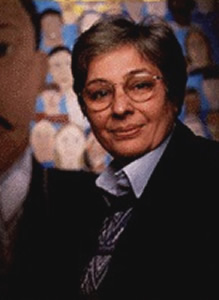
Radwa Ashour (26 mei 1946 – 30 november 2014)
De Belgische schrijver Hugo Raes werd geboren in Antwerpen op 26 mei 1929. Zie ook alle tags voor Hugo Raes op dit blog.
Uit: Ansichtkaart aan P.P. Rubens
“Uit de muziekwinkel die nu aan je huis paalt stuwt de geluidsinstallatie de laatste nieuwe Pink Floyd naar buiten.
Het is prachtig voorjaarsweer en de muziek galmt daarbijpassend, over de Wapper, die nu niet langer water is, maar een wandelpleintje. Aan de overzijde is een visrestaurantje gekomen. En je kan de binnenplaats zien van het Koninklijk Paleis waar ons huidig vorstenhuis afstand heeft van gedaan. Ze kwamen er nooit, en het kostte teveel aan onderhoud.
Nu is er het Internationaal Cultureel Centrum gevestigd, waar doorlopend tentoonstellingen worden gehouden. In de tuin staat ook een kunstwerk: vier groene neonbuizen (dit zijn lelijke buislampen) voor een spiegel…
Zon komt er ’s morgens niet meer in je tuin: op een veertigtal meter afstand is de nieuwe Schouwburg opgetrokken, en vanuit je tuin zie je op de haast blinde zijgevel van deze mastodont.
In je buurt zou je wel gemakkelijk een of ander automodel kunnen uitkiezen, want er staan er duizenden ter vergelijking. Ook in de omgeving: veel banken, geldbanken. Dat zal je wel niet mishagen.
Nu horen we weer de sexy stem van een erotische soul-zangeres.
Veel seks, Rubens, veel meer dan in jouw tijd. Eigenlijk is je werk niet erotisch, zijn je naakten helemaal niet sensueel. Als knaap kreeg ik wel visioenen wanneer ik Griekse beelden zag. Praxiteles en zijn landgenoten spraken mij meer aan. Jouw naakten lieten me eigenlijk koud. Dat lijkblauw dat overal in het wakke, platte vlees zit. Je roze-witte dames zijn dringend aan een dr. Atkins-dieet toe, ze lijden aan vetzucht. Je was een estheet, en toch, die lodderogen van je meisjes, en die dikke konten, en die petieterige flepse tepeltjes. Een soort moedersen tanteserotiek.”
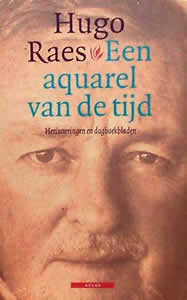
Hugo Raes (26 mei 1929 – 23 september 2013)
Cover
De Tsjechische dichter en vertaler Vítezslav Nezval werd geboren op 26 mei 1900 in Biskoupky. Zie ook alle tags voor Vítězslav Nezval op dit blog.
Bizarre Town
14
In the fountain
Amid the square
Floats
A diver
Searching
For yesterday’s sunset
25
A knight
In asbestos armor
Bent
Over a short oak log
Splits the wood
And throws it
Into a well
From which rises
Acrid
Flicker-tinged
Bluish smoke
Vertaald door Stephan Delbos en Tereza Novická
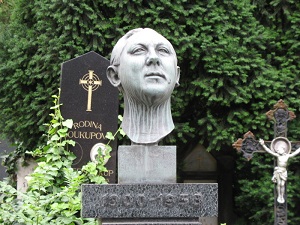
Vítězslav Nezval (26 mei 1900 – 6 april 1958)
Borstbeeld door Otakar Švec bij Nezvals graf op het kerrkhof van Vyšehrad in Praag
De Belgische, Franstalige, schrijver en essayist Ivan O. Godfroid werd geboren in Boussu op 26 mei 1971. Zie ook alle tags voor Ivan O. Godfroid op dit blog.
Uit: Pacte de contrition
« Le psychiatre n’est pas un sorcier moderne. Il n’est le détenteur d’aucune magie, et ne conna ît pas le miracle. La société, lorsqu’elle fait appel à ses connaissances, attend pourtant de lui qu’il en produise. S’il peut soigner la dépression, le psychiatre est incapable d’apaiser les préoccupations existentielles. Il est im-puissant face aux maux de la civilisation, et la nature profonde de l’homme est hors de son atteinte. Il est de surcroît la plupart du temps tributaire de la collaboration de son patient : il n’a pas non plus le pouvoir de faire changer les gens contre leur volonté. En outre, le lieu où il travaille parfois – l’hôpital – n’a d’autre prétention que d’écarter le malade de son milieu de vie habituel. L’hôpital psychiatrique, qui n’est jamais le lieu de la psychothérapie, n’est pas non plus celui de la transmutation des êtres. Aussi longtemps qu’il sera attendu du psychiatre des interventions magiques, il ne pourra que décevoir.
Le psychiatre n’est pas un régulateur social. Il n’est jamais l’arbitre des passions humaines: si l’usage de la brutalité en place du raisonnement est une très ancienne habitude de l’humanité, la folie n’est que rarement impliquée. En d’autres termes, si la violence existe en psychiatrie (l’Antiquité considérait déjà que les deux principales caractéristiques des malades mentaux étaient leur habitude d’errer sans but et leur propension à la brutalité), elle ne saurait pour autant être considérée comme une affection psychiatrique.”
Ivan O. Godfroid (Boussu, 26 mei 1971)
Boussu
De Amerikaanse dichter en schrijver Maxwell Bodenheim werd geboren op 26 mei 1892 in Hermanville, Mississippi. Zie ook alle tags voor Maxwell Bodenheim op dit blog.
South State Street: Chicago (Fragment)
Rows of blankly box-like buildings
Raise their sodden architecture
Into the poised lyric of the sky.
At their feet, pawn-shops and burlesque theatres
Yawn beneath their livid confetti.
In the pawn-shop windows, violins,
cut-glass bowls and satchels mildly blink
Upon the mottled turbulence outside,
And sit with that detached assurance
Gripping things inanimate.
Near them, slyly shaded cabarets
Stand in bland and ornate sleep,
And the glassy luridness
Of penny-arcade flays the eyes.
The black crowd clatters like an idiot’s wrath.
II
Wander with me down this street
Where the spectral night is caught
Like moon-paint on a colourless lane . . .
On this corner stands a woman
sleekly, sulkily complacent
Like a tigress nibbling bits of sugar.
At her side, a brawny, white-faced man
Whose fingers waltz upon his checkered suit,
Searches for one face amidst the crowd.
(His smile is like a rambling sword.)
His elbows almost touch a snowy girl
Whose body blooms with cool withdrawal.
From her little nook of peaceful scorn
She casts unseeing eyes upon the crowd.
Near her stands a weary newsboy
With a sullenly elfin face.
The night has leaned too intimately
On the frightened scampering of his soul.
But to this old, staidly patient woman
With her softly wintry eyes,
Night bends down in gentle revelation
Undisturbed by joy or hatred.
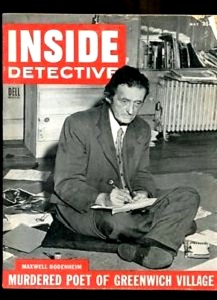
Maxwell Bodenheim (26 mei 1892 – 6 februari 1954)
Cover
De Duitse schrijfster Isabella Nadolny (eig. Isabella Peltzer) werd geboren op 26 mei 1917 in München. Zie ook alle tags voor Isabella Nadolny op dit blog.
Uit: Ein Baum wächst übers Dach
»»Die Hundehütte muß windgeschützt stehen, die könnte zum Beispiel innerhalb der Veranda in einer Ecke untergebracht werden«, schlug Mama vor.
Leo sah auf und grinste. Ich glaubte die Haut seiner Wangen knistern zu hören.
»Je nachdem, was wir investieren«, sagte er, »wird vielleicht das ganze Projekt nur eine Hun-
dehütte. – Wir bauen sowieso aus Holz!«
»Natürlich«, bekräftigte Mama, »in Rußland baut man immer aus Holz, auch für den Winter.«
Ich entflocht die Sesselfransen und stand auf. »Holz?« fragte ich. »Da quellen doch immer die Türen und Fensterrahmen, und nachher geht nichts mehr auf und zu, oder?«
Bruder Leo sah mich mit jenem Ausdruck an, den man so oft in den Augen älterer Brüder findet. Er besagt, daß man als Kind nicht genügend verhauen worden ist, und schließt die Frage ein, ob vielleicht noch Zeit sei, dies nachzuholen.
Da meine Beiträge zur Diskussion nicht willkommen zu sein schienen, bat ich Mama um sechzig Pfennig, weil ich in die Vieruhrvorstellung im Capitol gehen wollte.
»Aber den Film hast du doch schon zweimal gesehen«, sagte Mama. »Das ist ja Unsinn. Du kommst überhaupt viel zuwenig an die Luft. Hol Inge ab, und geht in den Englischen Garten.«
Der Englische Garten war eine der üblichen Härten des Lebens, weil es dort außer der frischen Luft für einen Backfisch nicht das geringste Interessante gab. So blieb ich denn noch ein Weilchen und hörte weiter zu.
»Ein Keller wird zu teuer, ist ja auch unnötig.
Soll man ein Bad vorsehehen?“
»Ein Bad? Für die paar Wochen? Kinder – ihr habt ja den See vor der Tür.«
»Nun ja, aber doch wenigstens einen Kachelofen und Doppelfenster«, sagte Leo. »Womöglich heirate ich eines Tages, und von meinen sechs Kindern haben dann mindestens drei gleichzeitig Keuchhusten. Die brauchen Luftveränderung, und wenn es da gerade Winter ist . ..«
Mama lachte. »Meinetwegen, sieh einen Kachelofen vor, es gibt ja auch mal kühle Sommer. Das Holz holen wir uns vom Strand, da liegt genug«, meinte sie optimistisch.“
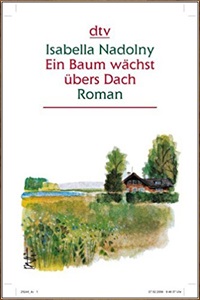
Isabella Nadolny (26 mei 1917 – 31 juli 2004)
Cover
De Franse schrijver Edmond de Goncourt werd geboren op 26 mei 1822. Zie ook alle tags voor Edmond de Goncourt op dit blog.
Uit:L’Italie d’hier/Domodossola
“L’Italie commence ici. — Ce sont des maisons énamourées de couleurs, des maisons bariolées de tons pistache, de tons lie de vin : des trompe-l’œil en détrempe de la pierre colorée, des mensonges du marbre. Il est même, à l’entrée de Domodossola, de fausses et ornementales maisons, peintes sur de pauvres bâtisses, ainsi que serait l’entrée trompeuse d’une ville qui n’existerait pas.
Et des maisons, de toutes parts, ouvertes au ciel bleu par de petits balcons aériens, offrant les plus charmants modèles de la serrurerie du dix-huitième siècle : cet art en faveur chez les jésuites. Et dans l’intérieur de ces maisons jouant au palazzo, des fonds de cours roux à la Decamps, et partout, sur les balcons et aux fenêtres, les nippes de la famille, étalées pour sécher, — car là, il n’y a pas la pudeur du linge.
Une place, qui a un pittoresque entour d’habitations, aux galeries cintrées des étages supérieurs, à l’arcature du rez-de-chaussée soutenue par des colonnes, dont quelques-unes sont anciennes. Au milieu de cette architecture baroque, vaguant et musant, des femmes, au foulard noue derrière la tête et leur mangeant les yeux, le torse pris dans une espèce de soutane de curé, à la taille trop courte, et qui leur donne l’air hommasse, — des femmes perpétuellement marmottantes, et comme mâchonnant des prières.
En ce petit monde de femmes, toutes coiffées de rouge ou de jaune orange, d’hommes habillés de couleur tabac d’Espagne, circulent, dans leurs souliers silencieux, des individus, au gigantesque tricorne, aux yeux perçants, une paire d’énormes lunettes sur leurs grands nez décharnés, un manteau à collet montant jusqu’aux lèvres blanches dune bouche sarcastique, descendant jusqu’aux genoux, et d’où parlent deux jambes maigres, enfermées en un bas noir : deux bâtons de fusain, emmanchés dans de lourdes chaussures aux boucles d’argent. Du manteau, une main s’échappant d’un pli, tient un gros parapluie de campagne : des individus étranges, et qui font un peu peur, et qu’un prendrait pour des caricatures ecclésiastiques, crayonnées sur les murs d’un cachot de l’Inquisition.”
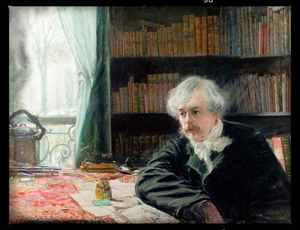
Edmond De Goncourt (26 mei 1822 – 16 juli 1896)
Portret door Giuseppe De Nittis, 1881
